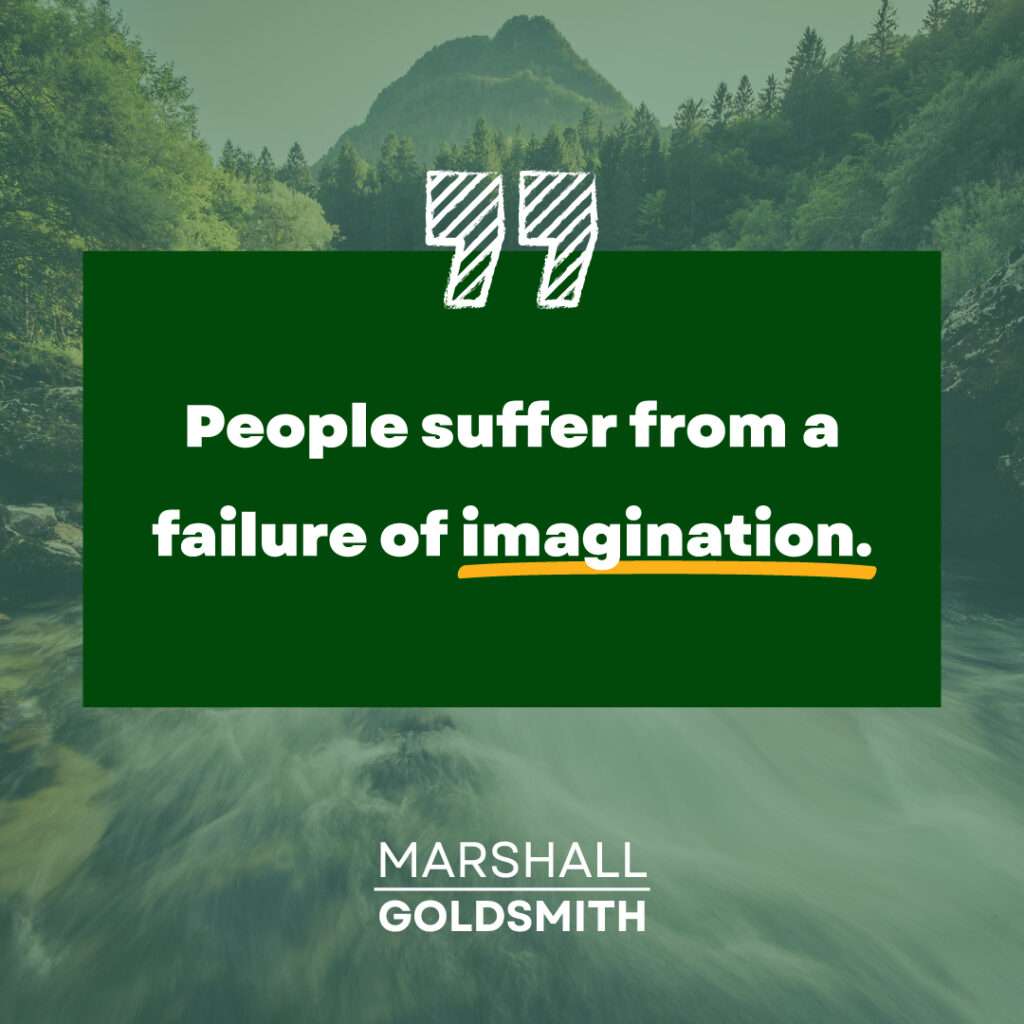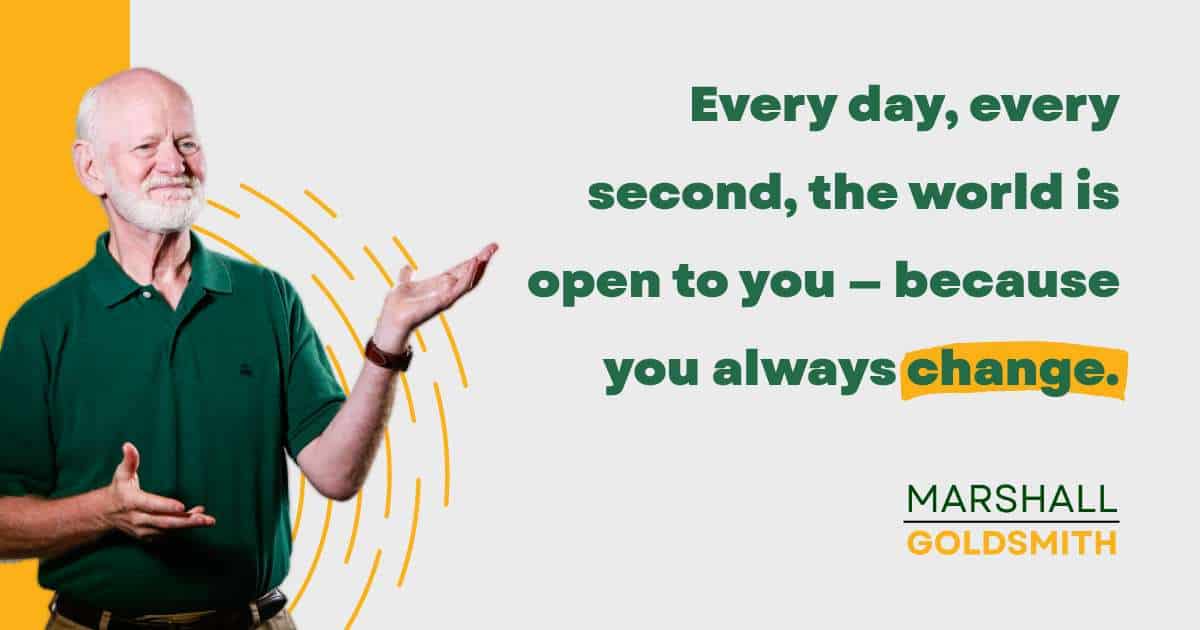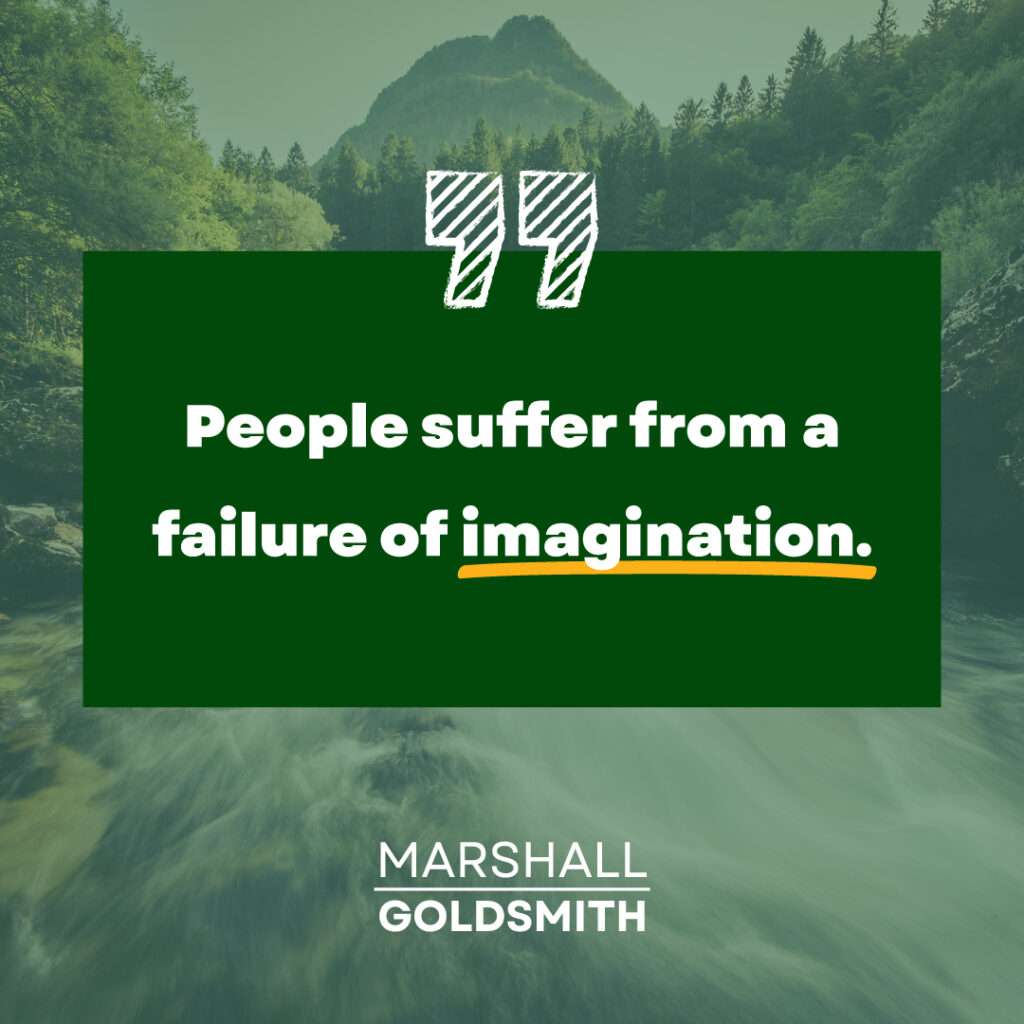Playing Favorites By Marshall Goldsmith There’s a reason I devote...
I know a coach whose first task for his clients is to have them draw up a list of their dreams, their goals, for the next five years. “Shoot for the moon!” he tells them: dream big. “Way too often, their goals are quite limited,” he tells me. “Sometimes it’s a matter of wanting to renovate a bathroom, or buy an extra car. I tell them that these are nice wishes to have, but they’re not real goals: They’re not life-changing.”
He then spends time with them, coaxing them into believing that they are capable of much more than they currently believe. He has to give them permission to use their imagination so that they can challenge themselves to create something big, rather than something that, for all their hopes for a new car or a bigger garage, are rather ordinary.
People suffer from a failure of imagination.
On the one hand, choosing between two or three valid ideas for the life you want to lead is a legitimate source of confusion for many people. On the other hand, some people cannot imagine even one path for themselves, let alone two or three.
I used to think creativity was a matter of taking two slightly dissimilar ideas and merging them into something original, such as serving lobster with steak and calling it Surf ’n’ Turf. You add A and B and you come up with D. Then a successful artist told me I was setting the bar too low. Creativity is more like taking A and F and L and coming up with Z. The greater the distance between the parts, the greater the imagination required to make them whole.

Only a precious few of us are A-plus-F-plus-L-equals-Z creative. Some of us are A-plus-B-equals-D creative. And, sadly, some of us can’t even imagine a world where A and B are in the same room.
Reading this is proof that you’re curious about self-improvement. Curiosity is how we prepare to fire up our imagination and picture something new.
If you’re among the 30 percent of Americans who have a college degree, you already know from your teenage years what it feels like to seek an identity reboot, a new presentation of self that will improve your odds of earning your place in the world. You already know how to imagine a fresh start.
Reflecting on his college years, the Pulitzer Prize-winning novelist Richard Russo, author of the novel, Empire Falls (which spun off an award-winning mini series of the same name),wrote, “College, after all, is where we go to reinvent ourselves, to sever our ties with the past,
to become the person we always wanted to be and were prevented from being by people who knew better.”
Russo compared college to “entering the witness-protection program. You’re supposed to try on a new identity or two. Indeed, it would not only defeat the purpose, it would be downright dangerous to leave the program easily recognizable as the person who’d entered it.”
Think back to your senior year in high school.
I’d venture to say that applying to college is the first time that you felt you exercised some control over your future. Although you were aware that the process was rigidly shaped by a cartel of guidance counselors, testing companies, and college admissions officers (not to mention your parents), you were nonetheless running the show, at the age of eighteen.
You assessed your strengths and weaknesses. You answered basic questions to set the criteria for the schools: distance, size, prestige, selectivity, social life, climate, cost, financial aid, and other factors. You chose how many schools to apply to. You wrote the essays and secured the recommendations. Then you waited for a decision. If your third or fourth choice college offered significantly better financial aid than your top choice, you adapted, either by solving the cost issue (taking out loans and working your way through college) or settling for the less appealing school and taking the money.
In a worst-case scenario – if disaster struck and you were shut out by all your top choices except your safety school – you learned how quickly you can accept and make peace with the “tragedy” of being offered only one choice. It is a lesson in taking lemons and making lemonade and your introduction to the agency that comes from having no choice.
Then you matriculated and discovered that whether you were the prom queen or class clown in high school, the socialite or brainy geek, college was your opportunity to delete your adolescence and write a new script. As Russo suggests, you could accurately measure the success or failure of your college years by how recognizable you were at graduation compared to the person who had entered the scene four years earlier. You did it once – you can do it again.
As life goes on, many people let go of that expansive sense of possibility. They rein in their imaginations because they believe their paths are set, or they have accumulated obligations that force them to take certain actions. They lose the imaginative freedom of dreaming big.
This doesn’t have to happen — you can course-correct, change course, live bigger and more fulfilled. But you have to become aware of what matters to you. You have to assess the factors of your life, your job, your career with the same sense of scrutiny and wonder as you did your college application process.
Every day, every second, the world is open to you — because you always change. When you become aware of this, you will think bigger and take advantage of this knowledge that nothing stays the same — and that this is a good thing.

Adding Too Much Value Won’t Get You There By Marshall...
C-Suite Master Class: No, But, However By Marshall Goldsmith Continuing...
The Doerr Institute: Expanding the Market for Coaches By Marshall...
Making Leadership Development Part of the College Degree at Rice...
Sanyin Siang – Winner of the Thinkers50 Marshall Goldsmith Coaching...
Thinkers50 Marshall Goldsmith Distinguished Achievement Award in Coaching – Nominees...
Leading with Influence: What Is Influence360°? By Marshall Goldsmith Founder...
Are You a Dominator, Manipulator, Persuader or Influencer? By Marshall...
Leading with Influence: Redefining Modern Influence Part 2 By Marshall...

My mission is simple. I want to help successful people achieve positive, lasting change and behavior; for themselves, their people, and their teams. I want to help you make your life a little better. With four decades of experience helping top CEOs and executives overcome limiting beliefs and behaviors to achieve greater success, I don’t do this for fame and accolades. I do this because I love helping people!
As an executive educator and coach, I help people understand how our beliefs and the environments we operate in can trigger negative behaviors. Through simple and practical advice, I help people achieve and sustain positive behavioral change.